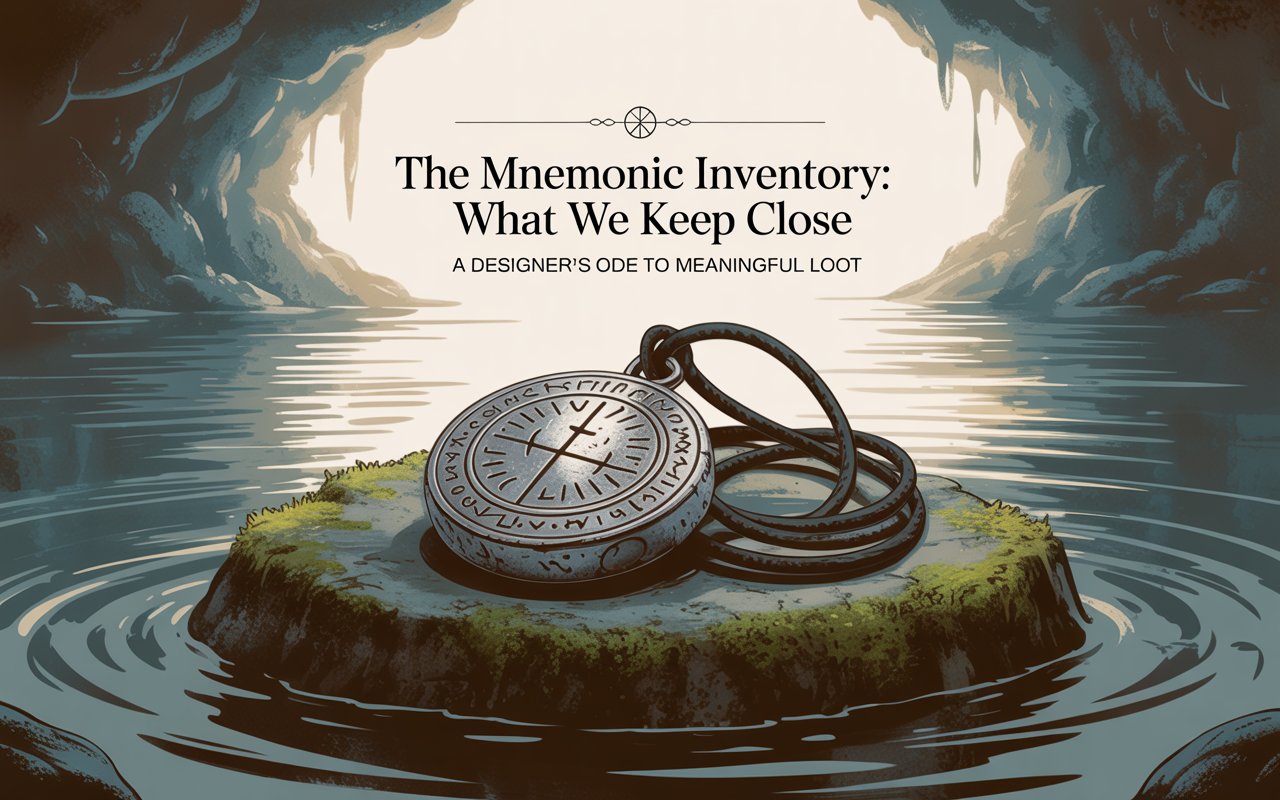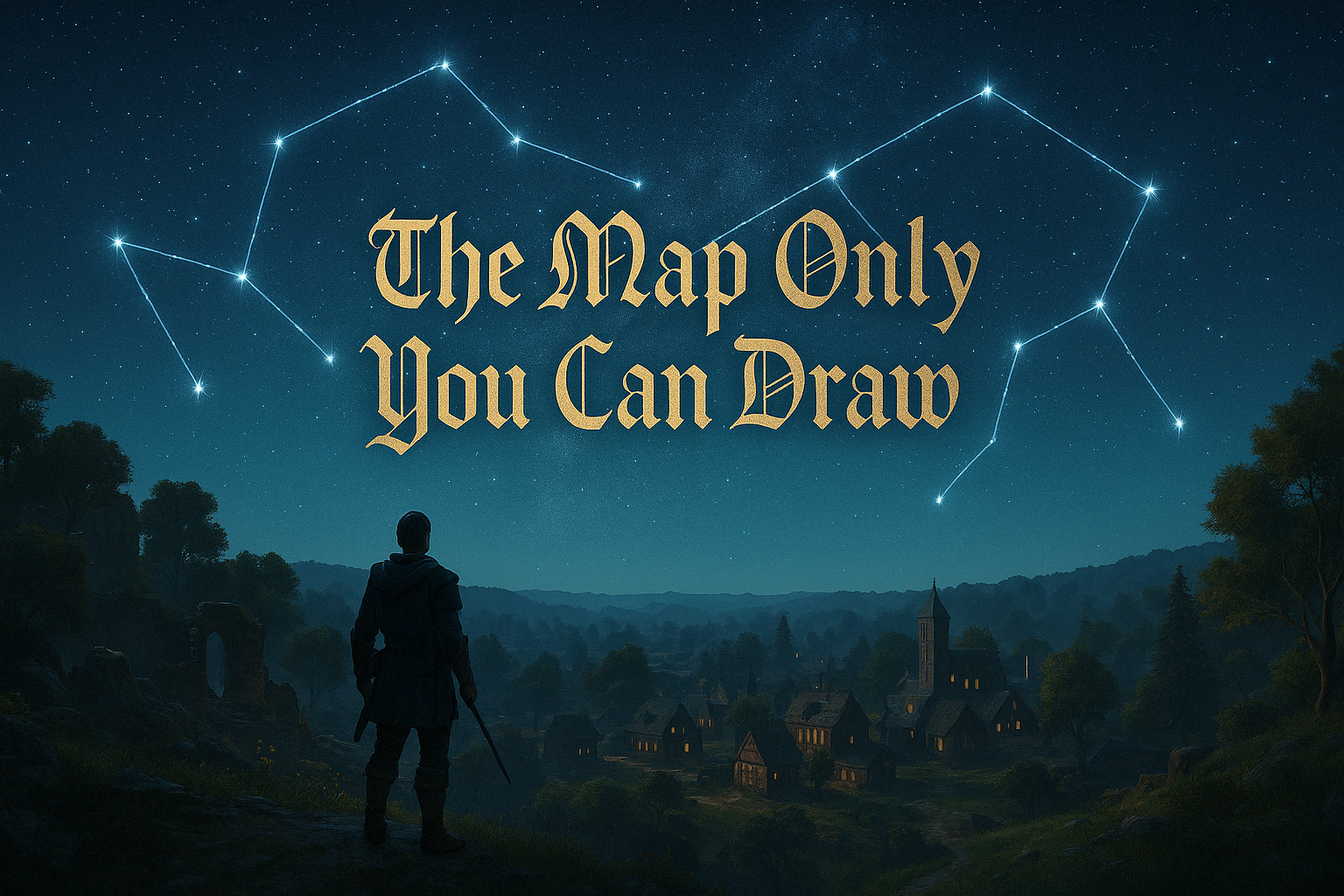Token Knowledge — The Art of Charms

Token Knowledge: The Art of Charms
A cloth pouch embroidered with a laughing fish. What does that mean for you?
For me, it reminds me of the first time I bartered with a river sprite. Nivalei, she called herself, a fey of the Upper Delimbiyr Vale. Her voice sounded like bells tossed into the current, and her hair floated around her face like moss threaded with stars. She was half-submerged beneath a willowroot dock, waiting, watching, draped in river-sheen and mischief.
I'd been traveling alone from Loudwater to Secomber, escorting a message scroll sealed by the Order of the Gauntlet. The road had been washed out in a spring flood, and the old bridge had collapsed. That left the river as my only path forward, and the sprite as its guardian.
She offered passage, but not for coin.
"Give me an answer," she said, "clever and clean. I've a riddle with no fixed meaning."
She raised a single feathered brow and said:
"I wander endlessly, yet follow a path. I wear no boots, yet leave a trail. I change all I touch, yet remain myself. What am I?"
I looked to the current, the stones, the moss tucked into the bank. I thought about movement, patience, and change.
"You're the river," I said. "You shape the world just by moving through it."
She didn't nod, but her expression softened, like ripples fading on the water's skin.
"Truth given in time," she replied. "Pass."
She drifted in a slow circle, sending soft ripples toward the bank.
"You think well," she said. "That's rarer than you know."
──────────────────
Then she reached beneath the surface and handed me the pouch.
I remembered the water's curve, the way the moss clung to stone. I thought like a river sprite might, fluid, elliptical, ancient. I absorbed the atmosphere, mapped my surroundings, and stepped into a different way of seeing. From that time on, I made a note to stay situationally aware and consider the speaker's perspective before leaping to conclusions.
Inside the pouch was a scallop shell the size of my palm. The sprite called it a Laughing Fish Shell, a charm for quick ears and fluent hearts. When I held it to my ear, it made a quiet, bubbling chuckle, like someone remembering a joke just a little too late. The charm let me catch nuances in Aquan I’d never studied, a dialect of the Primordial tongue shaped by currents and coral. It also helped me sense truth or mischief in the words of water-bound beings. I didn’t stash it for resale. I kept it close, like a compass. It reminded me to listen closely, to laugh when the world offered riddles instead of roads, and to seek out conversation in Faerûn’s overlooked pockets of wonder.
The Power of Carried Memory
That moment shifted how I thought about loot. The pouch wasn't a narrative flourish, it was a reminder that the right item could do more than buff stats. It could change how you entered a room, giving you the courage and initiative to speak to characters you might otherwise avoid. This new belonging, wholly yours, could encourage a quieter kind of preparedness. And every time I faced a puzzle or ambiguous conversation afterward, I remembered the sprite’s riddle, and how thinking like a river had gotten me through.
In The Hundred, we carry forward that same philosophy: pairing knowledge with tangible, purposeful rewards that players can feel proud to carry.
The Ancient Logic Behind Tangible Learning
The ancient scholars of Wendmor understood this wisdom, binding spells to runestones and memories to silverthread. As game devs, we bind knowledge to the charms you discover or earn throughout your journeys: prizes that harken back to wisdom villages imparted, running the gamut from belts to gauntlets. These are not decorative trinkets. A player who studies how elephants sense tremors might receive the Elephant-Tread Boots, which detect movement through stone and earth. A quest exploring cold-weather adaptations may award Polar-Paw Boots, styled after snow-clad mammals, which reduce cold damage in icy terrain. Each item connects directly to the knowledge just mastered. The gear works because you understood the lesson, and the lesson sticks because the gear continues to serve you.
Cognitive scientist Dr. Lynne Kelly reveals how this practice runs through our own history. Ancient cultures used physical tokens, knotted cords, marked stones, and carved wood as powerful mnemonic tools. In her works (The Memory Code and Knowledge and Power in Prehistoric Societies), she explains that these objects acted as extensions of memory. They anchored songs, ceremonies, and vital knowledge to tangible forms, allowing entire communities to retain complex information across generations.
Before the term "memory palace" conjured up marble halls of imagined architecture, it had a much humbler lineage. In oral cultures, knowledge wasn't written but rather carried. Dr. Kelly has shown how ancient communities used physical tokens like bark strips, feathered fans, and notched wood to encode maps, astronomy, migrations, and healing traditions. These were not decorative or ceremonial alone. They held layers of meaning, unlocking vast systems of understanding when touched, sung, or seen in context.
Because these tools had shape and presence, they could be passed hand to hand, taught across generations, and adapted over time without erasure. They kept information stable in a fluid world, anchors placed in the current.
That idea, of knowledge made touchable, is central to how we think about charms in The Hundred.
Not every treasure needs to be a stat-heavy drop. Some of the most potent items in a player's inventory are the ones that mark a moment. The object you received after answering a riddle. The keepsake tied to an NPC's story that lingered with you longer than the actual quest. Their effects are just the beginning. What they carry is memory: a trace of who you were when you earned them and how you've changed since.
Equippable Lore, Earned Through Play
This is why we embed educational factoids inside these charms. A charm referencing dolphin echolocation—the Amulet of Tidesingers—does not sit idle. It grants the ability to perceive movement through churning waters, unveil invisible creatures lurking in the depths, or sense ambushes amidst kelp-shrouded grottos. While most effective in aquatic or moisture-rich terrain, its resonance still sharpens perception across any shrouded space. Beyond its boons to awareness, it becomes a well-loved talisman as familiar as a path you've walked a hundred times
As a player, you are not recalling a glossary term. You’re navigating an open world where caves twist into ruins and mangroves mask both allies and ambushes. Nalani’s words linger: you wax nostalgic about how her eyes glittered as she spoke of dolphins in the Mirror World, each known by its whistle-call, carried across leagues. Your awareness stays sharp in fog-dim halls and shadowed groves alike, the amulet humming when a figure watches or waits nearby. Echolocation didn’t stay a dry lesson. It became raw instinct.
By tying information to useful tools, and those tools to player experience, we help learning take root. Knowledge becomes part of the gameplay loop. It lives in the player’s kit, in their choices, and in the confidence that grows as they explore.
Charms invite players to collect with purpose, tying each reward to moments, mentors, and tales worth carrying.
When you link knowledge to a concrete object—when remembering a fact also means holding onto a story, a place, a secret—you build memory traces that endure. The item becomes a key, unlocking insight long after the quest ends.
The Hundred is not a world where you simply loot and discard. It is a world where knowledge takes form and travels with you.
And the most powerful knowledge?
It’s not simply remembered.
It’s equipped!
